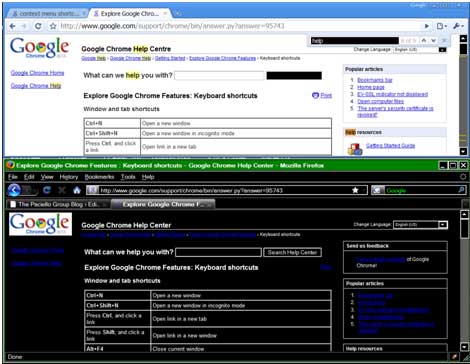Free ARIA
Aaron Leventhal has set up a new group for people who want to help provide free tools and resources for the advancement of WAI-ARIA.
Upcoming Webinar: May 14 at 4 PM ET. Marking a Milestone: Celebrating 30 Years of JAWS on Global Accessibility Awareness DayRegister Now

Refer to Google Chrome accessibility update (07/12) Google have launched their new browser, I like many other people have been very keen to install and use it. My first impression…
September 3, 2008 | Technical
The Helen Project is an initiative by the American Foundation the Blind to provide all internet users, especially people with disabilities, the opportunity to register publically available feedback on the…
September 2, 2008 | Technical
I for one have been waiting to hear this news. One of the big 2 commercial screen readers will now support WAI-ARIA live regions. Let’s hope that this prompts GWMicro…
August 22, 2008 | Technical

Martin Kliehm has proposed a panel for South by Southwest (SXSW) held March 13-17, 2009 in Austin, Texas. : ‘Hands-On Accessible Rich Internet Applications (ARIA)’ .
August 9, 2008 | Technical
There a bunch of interesting posts on Marco’s blog about WAI-ARIA: The first one ARIA in Gmail #1: Alerts is about the use of the WAI-ARIA role=”alert” and its use…
August 7, 2008 | Technical
Update 08/08/09 What the King of HTML5 giveth, he taketh away. The use of { } is now HTML5 history. You can wonder at the greatness of his latest proclamations…
August 4, 2008 | Technical
Gez Lemon from TPGi has written an article for Dev.Opera, which provides an Introduction to WAI ARIA.
July 31, 2008 | Technical
I started to write a post about the new social accessibility tools/services that have been announced in the last week or so: IBM Social Accessibility Project and Webvisum.
July 18, 2008 | Technical
Raising Issues In order to raise an issue or proposal in regards to the HTML5 specification you do not have to be a member of the W3C HTML Working Group…
July 4, 2008 | Technical
After covering a basic ARIA slider as well as a more complex slider component, we will take a closer look at how a slider can be used to create a…
June 20, 2008 | Technical
In my previous post I gave an example for a very minimalistic ARIA slider, with the intention of demonstrating how simple it is to add ARIA using only a few attributes. I know there are some developers out there who wishfully think that, in order to make their rich interface widgets accessible, all they have to do is add ARIA to it. Others are skeptical about ARIA for that very reason. The truth is of course that ARIA is only part of the effort, and work is required to make any widget accessible (whether you’re using ARIA or not). In this post I want to cover some of those issues and give an overview of what else to think about when creating an accessible slider.
June 16, 2008 | Technical
While at @media I had the opportunity to meet up with Lachlan Hunt, who works at Opera and is a fellow W3C HTML5 working group member. He did a short…
June 6, 2008 | Technical
Last Friday I had the pleasure of presenting at @media 2008 on WAI-ARIA, the Web Accessibility Initiative Accessible Rich Internet Applications specification. The slides from the presentation WAI-ARIA It’s Easy…
June 4, 2008 | Technical
Starting with Steve’s article ARIA Toggle Button and Tri-state Checkbox examples, we will be providing more examples about how to use ARIA roles and states in practice. As Steve mentioned,…
May 30, 2008 | Technical
As part of my presentation at the Accessibility 2.0 Conference I demonstrated a preferences module conceived by Hans Hillen, Gez Lemon and I, as a proof of concept(s) for ways…
May 9, 2008 | Technical
The HTML5 editor has recently stated in his defence of the alt being optional: “We truly do believe in research, hard data, and analysis, rather than hypotheticals; and we truly…
May 1, 2008 | Technical
The facility to detect some Assistive Technology by using Flash has been around since ActionScript 1.0 and Flash Player 6. The method has usually been referred to as a way…
April 28, 2008 | Technical